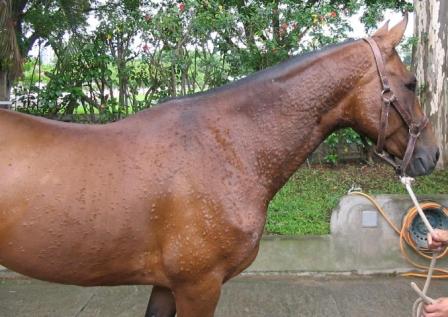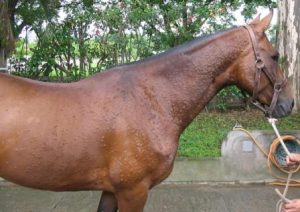Nutritional Support for Equine Allergies

Just this summer, I’ve noticed Lee Lee rubbing her neck and chest on her stall door when she comes up to eat. Itchy skin and rubbing to relieve it is a telltale sign of an allergy so I’ve been working to address the problem.
Allergies are fairly common in horses–just as they are in people. And since I’m a fan of holistic horse health, I decided to do a three-part series on allergies in horses. In each post, I’ll focus on a different holistic treatment that can be used to address allergies: nutritional support, essential oils, and acupressure.
But let’s back up for a second and talk about what allergies are exactly.
Allergies in horses typically manifest in the skin or the lungs, but they can also affect the digestive system. As you probably know, allergies can range from fairly mild to life-threatening anaphylactic shock, which is usually a reaction to a vaccine or drug.
According to Western medicine, an allergy is a reaction to some type of external stimuli such as dust, pollen, or insects.
The traditional (allopathic) allergy treatments often include antihistamines or steroids that work to treat the allergy symptoms. But unfortunately, these medicines don’t get to the root cause of the problem.
Eastern medicine says that allergies result from an imbalance in the immune system. As this informative article from Natural Horse Magazine states, “Contrary to popular opinion, allergies are not caused by an allergen; they are caused by the hypersensitive state of the animal to the allergen. The allergen is just the trigger that sets off the reaction.”
Although it’s not always easy, Eastern medicine aims to get to the root of the problem and restore balance within the immune system. Sometimes, the allergies can be completely eliminated, but in other circumstances, they can only be managed.
The key with holistic allergy treatments is sticking with them–it may take up to a year or more to see results. But, personally, I believe this is the way to go.
Of course, identifying the allergen(s) and removing it, if possible, from the horse’s environment or diet is usually the first step, but sometimes this can be very difficult–especially with skin allergies (like with Lee Lee).
In my opinion, nutrition is one of the best ways to address allergies (as well as many other issues) in horses. If we think of an allergy as an imbalance in the immune system, what better way to boost and support the immune system than through nutrition?
What to Stop Feeding
For skin allergies, many nutritionists and holistic practitioners recommend eliminating sweet feeds and high-protein feeds as they can contribute to inflammation. Feeds with molasses, sugar, or corn, should be the first to go. Another thing to eliminate is corn oil or any other vegetable oil which is high in omega 6 content (these are also pro-inflammatory.)
For lung allergies (such as heaves) eliminating dust and mold is crucial. This could mean avoiding dusty feeds and hay (especially round bales) and also possibly soaking hay or feed to eliminate dust.
What to Start Feeding:
There are several different supplements and herbs that can help support the immune system and are often used as nutritional support for allergies. Here are a few:
- Flax, hemp, or chia seeds–the omega 3’s present in these supplements can help reduce inflammation and strengthen the immune system; especially helpful for skin allergies (I like Omega Horse Shine’s flax);
- Spirulina (blue-green algae)– ‘super food’ high in vitamins, minerals, proteins, amino acids, and omega 3 and 6 oils; can be used for lung or skin allergies (I’m currently feeding this brand to Lee Lee);
- Vitamin C— An antioxidant which supports the immune system. Adding 3-5 grams of this vitamin is a safe bet for horses prone to skin or lung allergies;
- Other antioxidants such as Vitamin E (especially if horse doesn’t have access to pasture);
- Chondroitin sulfate–it’s not just beneficial for joints! Dr. Kellon recommends 2500-5000 mg/500 lbs of body weight, twice a day for skin allergies (start feeding before seasonal itching begins for the best results); and
- Jiaogulan–this adaptogenic herb is good for several conditions, including lung allergies.
Paying attention to mineral balance–especially magnesium and trace minerals– can also be influential in reducing/ eliminating both lung and skin allergies.
So, if you’ve never considered including nutritional support in order to help your horse with allergies, I recommend you check into it. Talk to your vet or a nutritionist if you have specific concerns.
For the next post in this equine allergy series, I’ll focus on essential oils and aromatherapy.
Ta-ta,
Casie
<Source>
